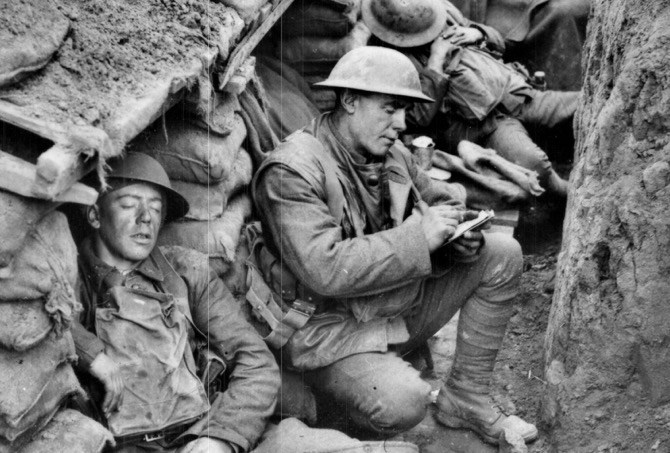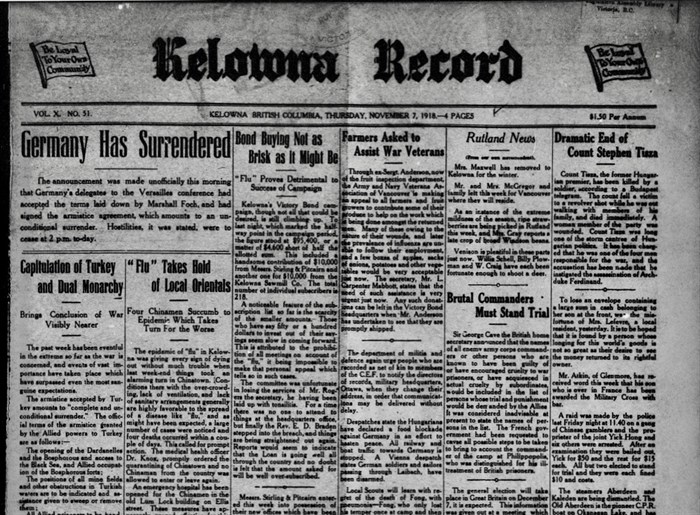
Canadian soldiers in a trench during the First World War.
Image Credit: Veterans Affairs Canada
November 06, 2018 - 8:00 PM
KELOWNA - This Remembrance Day marks the 100th anniversary of the armistice that marked the end of the First World War.
The headline that ran in the Kelowna Record newspaper on Nov. 7, 1918 read: Germany Has Surrendered.
As it turned out, that was the premature “banner” headline in the Nov. 7, 1918 edition of the Kelowna Record. It was a “banner” headline in that it was unusual to have such large print carrying over two of the paper’s six columns.
The news story was short.
“The announcement was made unofficially this morning that German’s delegates to the Versailles conference had accepted the terms laid down by Marshall Foch, and had signed the armistice agreement, which amounts to an unconditional surrender. Hostilities, it was stated, were to cease at 2 p.m. to-day.”

The Nov. 7, 1918 edition of the Kelowna Record called an early end to the Second World War.
(UBC ARCHIEVES / iNFOnews.ca)
In fact, it was not until four days later that the war actually ended, on the 11th hour of the 11th day of the 11th month of 1918. The New York Times reported the end of hostilities to take effect at 11 a.m. Paris time that day.
It wasn’t until a week later, on Nov. 14 (the Kelowna Record published once a week on Thursdays) that the celebrations of victory were reported with other news like a city council report headlined: Council Meets Amid Celebration Noise and Health Committee Makes Report on Influenza Epidemic.
The influenza epidemic gripping the fledgling city (population maybe about 2,000) had hit 150 people and caused 10 deaths to that date but seemed to be waning. It was reported that three hospitals had been opened to deal with the outbreak, “one in the High School, one for Chinese in the Lum Lock building and for Japanese on Harvey Avenue.”
Another headline announced Kelowna Celebrates Peace in Wild Burst of Joy and reads, in part:
“News that Germany had indeed signed the armistice terms, and her own death warrant as a fighting force, came to Kelowna by seven o’clock Monday morning. People were cautious, however, after last Thursday’s false alarm and the whistles did not begin to announce the glad news until about 9 o’clock. When the truth at length began to penetrate the effect was electrical. Work was dropped with an accord and sober citizens began to cut loose like a school dismissal.”
The celebration was initially spontaneous but was followed by a parade and speeches by politicians and church leaders, mostly drowned out by the celebrations.
It’s hard to get precise data about that time in Okanagan history from today’s internet offerings.
Back then the census was taken every 10 years, in 1911 and 1921. Some records are no longer available but we do know the population of B.C. grew by almost 34 per cent in that decade.
And we do know that Kelowna’s population in 1921 was 2,520 so, by extrapolation, we can guess that, on July 28, 1914 – the day the war officially broke out – Kelowna had a population of about 1,900 people.
We also know, by counting the names on the Cenotaph in City Park, that 136 Kelowna men lost their lives during the war – or about seven per cent (or possibly as high as 14 per cent) of the male population.
To put that in perspective, if Kelowna was to lose seven per cent of our current population of about 128,000 that would mean more than 9,000 dead – three times the number killed in the World Trade Centre attack on Sept. 11, 2001.
Those four years of war were hell for the Canadian men and women who went overseas. Almost 425,000 of the 620,000 enlisted went overseas. Of those, about 61,000 were killed and 172,000 wounded.
We also know the price of some basic foodstuffs in Canada in 1920.
A dozen eggs cost 71 cents ($10.32 in today’s dollars), a quart of milk 15 cents ($2.18 in today’s dollars) and a pound of butter 63 cents ($9.16 in 2018 dollars).
Those early newspapers do give some taste of what life was like for those at home during the war.
There’s one story about Lieut. C. Hereron being wounded: “Mr. M. Hereron received a wire this week telling of the wounding of his son Lieut. Charles Hereron. No statement is made as to whether seriously or not, but it is to be hoped not. It would be hard lines on Charlie after going through so much if he were to be badly hurt right at the finish.”
An edition of the Record from two years earlier (Nov. 9, 1916) carries less direct war news (Canadian troops to winter in England for training, a plot uncovered where Germans were trying to get Swiss farmers to emigrate to Canada to spread hoof and mouth disease to cattle) but it was full of the side effects of war.
The Okanagan Ambulance League made and shipped 125 pairs of socks along with number other articles of clothing to headquarters. Mrs. Gaddes was thanked for the loan of her sewing machine.
City council was considering a donation to the fire brigade after a big fire, and the school report listed enrolment of 318 students with 152 having perfect attendance in October, followed by a list of those on the honour roll.
And one 'good news' story about the car shortage that led Calgary wholesalers to cancel their fruit orders with Washington State growers and switch to the Okanagan because the shorter hauling distance may provide better service.
“If this should prove to be the case, it should be of no small advantage to the B.C. growers,” the article concludes, an attitude that put a positive spin on a frightfully difficult time in our history.
To contact a reporter for this story, email Rob Munro or call 250-808-0143 or email the editor. You can also submit photos, videos or news tips to the newsroom and be entered to win a monthly prize draw.
We welcome your comments and opinions on our stories but play nice. We won't censor or delete comments unless they contain off-topic statements or links, unnecessary vulgarity, false facts, spam or obviously fake profiles. If you have any concerns about what you see in comments, email the editor in the link above.
News from © iNFOnews, 2018